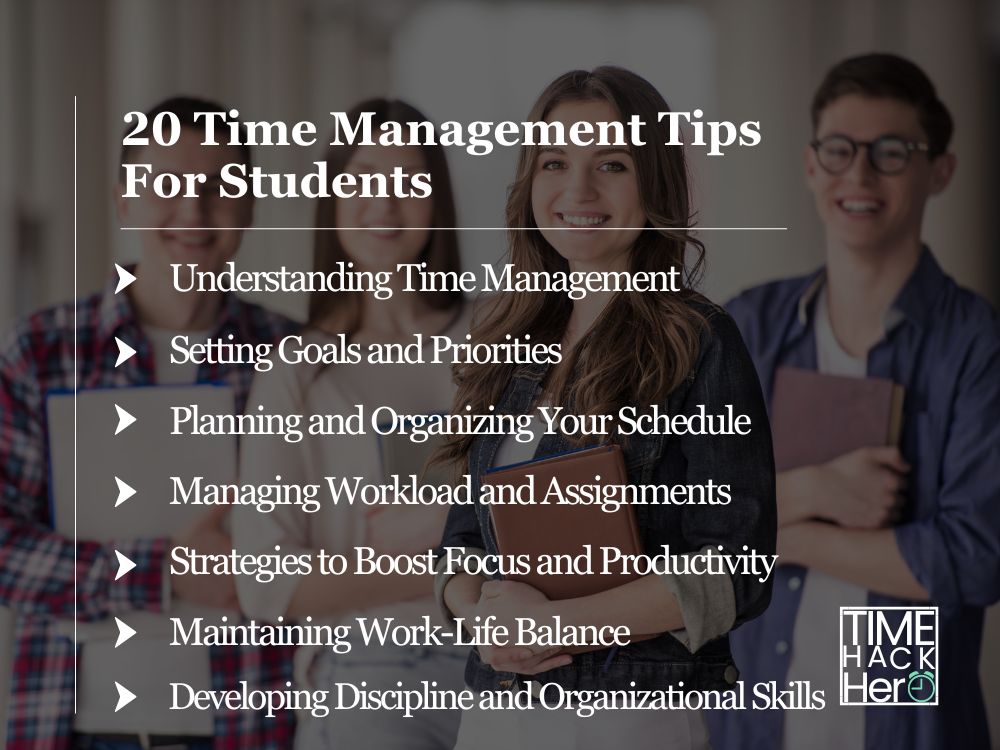In today’s fast-paced academic environment, effective time management is essential for students to balance their academic, extracurricular, and social commitments. With a myriad of responsibilities and deadlines, mastering the art of allocating their time wisely can greatly impact a student’s overall success. The following article presents 20 time management tips specifically tailored to help students stay organized, optimize their productivity, and minimize stress throughout their educational journey.
Many students find themselves overwhelmed by their schedules and struggling to maintain a healthy work-life balance. By integrating practical time management strategies into their daily routine, they can make the most of the available hours and enhance their performance in various aspects of their life. From setting realistic goals to prioritizing tasks, these evidence-based techniques will empower students to take control of their time and achieve their academic and personal objectives.
To get started on the path to effective time management, it’s important to recognize that each student’s situation is unique, and the tips present in this article can be tailored to suit individual needs and preferences. By implementing one or more of these strategies, students will not only improve their time management skills but also foster a more structured, organized, and focused approach to their academic and personal pursuits.
Table of Contents
Understanding Time Management
Time Management Importance
Time management is a crucial life skill, particularly for high school, college, and university students. With a multitude of academic responsibilities, personal commitments, and extracurricular activities, efficiently managing time helps students maintain a well-balanced lifestyle. Effective time management enables students to prioritize tasks, reduce procrastination, and boost confidence in their ability to accomplish goals.
To reinforce the importance of time management, here are some benefits that students may experience:
- Improved academic performance
- Reduced stress and anxiety
- Increased self-discipline and focus
- Enhanced overall productivity
The Role of Balance
Striking the right balance between academic work, personal life, and other activities is essential for students. Achieving equilibrium allows them to manage their day-to-day tasks while also finding time for relaxation and self-care. A balanced approach to time management helps students avoid burnout and ensures they allocate sufficient time to all aspects of their lives.
Some tips for maintaining balance include:
- Establishing a daily schedule
- Setting realistic short and long-term goals
- Prioritizing tasks and assignments
- Allocating sufficient time for relaxation and socialization
Productivity
Productivity is directly linked to time management, and mastering this skill is vital for students at all educational levels. By effectively managing time, students can accomplish more tasks within a shorter period, boost their academic performance, and enhance their overall productivity.
Here are some strategies to improve productivity:
- Remove distractions and maintain an organized workspace
- Break tasks into smaller, manageable portions
- Use time management tools and techniques, such as time blocking or the Pomodoro technique
- Regularly evaluate and adjust time management strategies as needed
By understanding the importance of time management, maintaining a balanced approach, and focusing on productivity, students can better manage their academic workload and excel in their educational pursuits.
Setting Goals and Priorities
Identifying Priorities
The first step in managing your time effectively is identifying your priorities. Priorities give you a sense of direction and help you stay focused on what’s important. Start by making a list of all your tasks and responsibilities, and categorize them into different areas such as academics, extracurricular activities, and personal life. Then, rank your tasks based on their importance and urgency. This way, you’ll be able to devote your time and energy to the most pressing tasks first. Remember to frequently review and update your priorities as they may change over time.
Creating Realistic Goals
Once you’ve identified your priorities, the next step is to set realistic goals. Setting goals not only provides motivation but also helps you measure your progress. When setting goals, use the SMART criteria:
- Specific: Clearly define your objective.
- Measurable: Ensure that you can track your progress and measure the outcome.
- Achievable: Your goal should be challenging yet attainable.
- Relevant: Relate the goal to your priorities and overall objectives.
- Time-bound: Set a deadline to maintain a sense of urgency.
By following these guidelines, you’ll have a better chance of reaching your goals and maintaining a balanced approach to your responsibilities.
Breaking Down Large Projects
Sometimes, large projects can be intimidating and overwhelming. To manage them effectively, break them down into smaller, manageable tasks. Creating a detailed plan with deadlines for each sub-task helps you keep track of your progress and ensures you don’t miss any due dates. This approach not only decreases stress and procrastination but also makes it easier to identify potential obstacles and make adjustments when necessary.
In summary, setting goals and priorities is a critical component of successful time management for students. By identifying priorities, creating realistic goals, and breaking down large projects, you can effectively manage your time and accomplish more in your academic and personal life.
Planning and Organizing Your Schedule
Creating a Master Schedule
A master schedule is essential for effective time management. Start by using a calendar to input all your commitments, such as classes, extracurricular activities, assignment deadlines, and exams. This will give you a visual overview of your responsibilities and make it easier for you to allocate time for studying and leisure activities. You can use a physical calendar or a digital one, whichever works best for you.
Incorporating Routines and Flexibility
Establishing routines will help you manage your time more efficiently. Set a time for waking up, studying, and other activities each day, so your body and mind get used to this rhythm. However, remember to include some flexibility in your schedule, as unexpected events or changes in plans might occur. Allowing room for adjustments helps to reduce stress and ensures that you can still meet your goals.
Consider incorporating the following routines:
- Regular study hours
- Designated time for chores and errands
- Breaks between study sessions
- A consistent bedtime
Utilizing Time Blocking and Pomodoro Technique
Time blocking is a scheduling method that involves dividing your day into designated time slots for different activities. This helps in avoiding multitasking and focusing on completing one task at a time.
| Time | Activity |
|---|---|
| 9-12 | Classes |
| 12-1 | Lunch |
| 1-3 | Study time |
| 3-4 | Extracurriculars |
| 4-5 | Break/Exercise |
| 5-7 | Study time |
| 7-8 | Dinner |
| 8-10 | Relaxation/Social |
| 10-11 | Wind down |
| 11 | Sleep |
The Pomodoro Technique is another useful time management tool. It involves breaking your study time into 25-minute intervals, called “Pomodoros,” followed by a 5-minute break. After every four Pomodoros, take a longer break (15-30 minutes). This method boosts productivity and reduces the risk of burnout.
By following these tips and strategies, you’ll be on your way to effectively managing your time and achieving academic success.
Managing Workload and Assignments
Breaking Assignments into Smaller Tasks
Breaking large assignments into smaller tasks is an effective way to manage your workload and better understand what needs to be done. By doing so, you can focus on one part at a time, making the overall project feel less daunting. In addition, smaller tasks are easier to schedule and allocate time to, which can help improve your overall time management. Here’s a recommended approach:
- Identify the main components of an assignment
- Break down each component into smaller tasks
- Estimate how long each task will take to complete
- Prioritize tasks based on their importance and deadline
- Schedule time for each task, making sure to factor in breaks and other commitments
Tracking Due Dates and Reminders
To effectively manage your workload, it’s crucial to track assignment due dates and set reminders for yourself. This can help ensure that you don’t miss any important deadlines and can allocate time appropriately for each task. You can use a physical or digital calendar, planner, or to-do list to keep track of your deadlines and tasks. Key points to remember:
- Enter all assignment due dates and exam times at the beginning of the term
- Set reminders for important dates and milestones within each project
- Review your calendar regularly to stay aware of your upcoming deadlines
- Update your schedule as needed, making sure to account for any changes in deadlines or priorities
Joining a Study Group
Joining a study group can be an efficient way to manage your workload and make progress on assignments. Study groups provide a place to collaborate, ask questions, hold each other accountable, and learn from your peers. This can help you better understand difficult concepts and work through assignments more efficiently. Here are some tips for joining a study group:
- Choose a group with a mix of people who share similar goals and study habits
- Establish meeting times, locations, and rules that work for everyone
- Rotate responsibilities, such as leading discussions, taking notes, or bringing study materials
- Collaborate on assignments or tasks by dividing them into smaller sections, working on them together, and providing feedback to each other
- Stay focused and engaged in the group, remembering the primary goal is to study
By following these tips, you can efficiently manage your workload and better prepare yourself for academic success.
Strategies to Boost Focus and Productivity
Eliminating Distractions and Multitasking
To enhance focus and productivity, start by eliminating distractions. This includes turning off notifications on your smartphone, closing irrelevant websites or social media, and setting up a dedicated study space. Avoid multitasking as it can reduce concentration and lead to increased errors. Instead, focus on one task at a time for maximum productivity.
Setting Daily Priorities and To-Do Lists
Create daily to-do lists to help manage tasks and prioritize them based on urgency and importance. This helps organize tasks and makes it easier to identify the most impactful tasks. Break down large tasks into smaller steps, and use the following format for a simple to-do list:
- Priority A: High-priority tasks
- Priority B: Medium-priority tasks
- Priority C: Low-priority tasks
Incorporating Breaks and Exercise
Regular breaks and exercise can help improve focus and productivity. Consider implementing short breaks, say, for every 45-60 minutes of studying. Additionally, engaging in physical activity, such as a brisk walk or stretching, can improve blood circulation and mental alertness.
Monitoring Time Use with Time Logs and Apps
Keep track of how you use your time to identify potential time-wasters and adjust habits accordingly. Time logs help monitor daily activities, while apps, such as RescueTime, can track time spent on websites and overall screen time. Analyze the collected data to identify areas for improvement.
| Time Period | Activity | Duration |
|---|---|---|
| 9:00 – 9:45 | Physics homework | 45 min |
| 9:45 – 10:00 | Break | 15 min |
| 10:00 – 10:45 | Math tutoring | 45 min |
| … | … | … |
Adopting the Pomodoro Technique
The Pomodoro Technique is a straightforward time management method that can help maintain focus and productivity. To use this technique, follow these steps:
- Set a timer for 25 minutes
- Work on a single task until the timer rang
- Mark off one Pomodoro and record what you completed
- Take a 5-minute break
Repeat this process, and after completing four Pomodoros, take a longer break (15-30 minutes).
Maintaining Work-Life Balance
Finding Time for Hobbies and Sports
Striking the right balance is key in navigating through your university life. One component of achieving harmony is ensuring there is time for hobbies and sports. By dedicating time to activities you enjoy, you can better manage stress and improve focus. Here are some suggestions:
- Create a schedule that includes specific time slots for pursuing hobbies or sports. Doing so ensures you allocate sufficient time for leisure alongside coursework or job responsibilities.
- Consider integrating hobbies into your study breaks, as this can help recharge your brain and make your study sessions more effective.
- Join clubs or organizations on campus to engage with like-minded individuals. This can provide social support while pursuing interests, ultimately contributing to a more successful work-life balance.
Incorporating Sleep and Self-Care Practices
In addition to finding time for hobbies and sports, prioritizing sleep and self-care is crucial for overall well-being. Here’s how to incorporate these practices into your routine:
- Establish a consistent sleep schedule: Aim for 7 to 9 hours of sleep each night, even during busy periods. Consistent sleep patterns can boost cognitive abilities and academic performance.
- Create a relaxing bedtime routine: Rituals like reading, taking a warm bath, or practicing calming activities, such as meditation or gentle stretching, can set the stage for restful sleep.
- Take care of your physical health: Make time for regular exercise, eat a balanced diet, and stay hydrated. These practices support cognitive function and enhance energy levels, making it easier to maintain a balanced lifestyle.
- Schedule self-care activities: Just as you plan for studying or attending classes, allocate time in your schedule for activities that promote well-being. This may include spending time with friends, engaging in mindfulness practices, or seeking professional support when needed.
By following these guidelines, you can better establish equilibrium between your academic, professional, and personal life, ultimately achieving a more harmonious work-life balance.
Developing Discipline and Organizational Skills
Staying Committed to Routines and Plans
Developing self-discipline is crucial for students to achieve success and graduate on time. A core component of self-discipline is consistently following routines and plans. Creating a master schedule at the beginning of each term helps students allocate time for all their commitments, including classes, assignments, exams, and extracurricular activities.
- Stick to daily routines: Establish a consistent morning and bedtime routine, as well as study habits to ensure consistency.
- Break tasks into manageable chunks: Divide larger assignments or tasks into smaller tasks to keep motivation high and prevent feeling overwhelmed.
- Prioritize tasks: Focus on completing important tasks first, such as assignments with the nearest due dates, to avoid procrastination.
Using Technology Responsibly
In addition to traditional organizational skills, students must also learn to use technology responsibly to manage their time effectively. Here are some tips for making the most of technology while staying disciplined:
- Use digital calendars: Utilize digital calendars such as Google Calendar to plan and track appointments, deadlines, and events.
- Leverage time management apps: Explore apps like Forest, Trello, and Todoist for a user-friendly way to manage tasks, set reminders, and stay on track.
- Filter emails: Organize your inbox by filtering and labeling emails based on their importance, to streamline communication and avoid missing important information.
- Limit distractions: Utilize browser extensions or apps to block distracting websites during study sessions and allocate dedicated time for breaks and leisure.
Remember, while technology can be an excellent tool for improving time management and organizational skills, it is crucial to use it responsibly. Self-discipline plays a vital role in balancing the use of gadgets and apps with schoolwork and personal life. By developing solid routines, staying committed to plans, and incorporating technology mindfully, students can achieve greater success throughout their academic journey.









